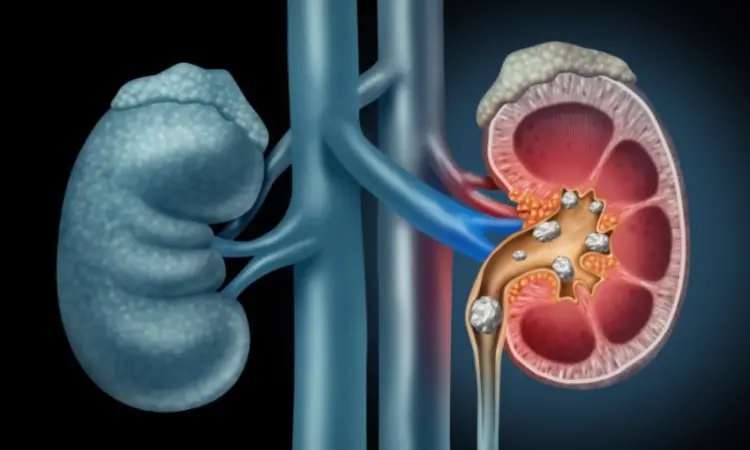- Home
- Medical news & Guidelines
- Anesthesiology
- Cardiology and CTVS
- Critical Care
- Dentistry
- Dermatology
- Diabetes and Endocrinology
- ENT
- Gastroenterology
- Medicine
- Nephrology
- Neurology
- Obstretics-Gynaecology
- Oncology
- Ophthalmology
- Orthopaedics
- Pediatrics-Neonatology
- Psychiatry
- Pulmonology
- Radiology
- Surgery
- Urology
- Laboratory Medicine
- Diet
- Nursing
- Paramedical
- Physiotherapy
- Health news
- Fact Check
- Bone Health Fact Check
- Brain Health Fact Check
- Cancer Related Fact Check
- Child Care Fact Check
- Dental and oral health fact check
- Diabetes and metabolic health fact check
- Diet and Nutrition Fact Check
- Eye and ENT Care Fact Check
- Fitness fact check
- Gut health fact check
- Heart health fact check
- Kidney health fact check
- Medical education fact check
- Men's health fact check
- Respiratory fact check
- Skin and hair care fact check
- Vaccine and Immunization fact check
- Women's health fact check
- AYUSH
- State News
- Andaman and Nicobar Islands
- Andhra Pradesh
- Arunachal Pradesh
- Assam
- Bihar
- Chandigarh
- Chattisgarh
- Dadra and Nagar Haveli
- Daman and Diu
- Delhi
- Goa
- Gujarat
- Haryana
- Himachal Pradesh
- Jammu & Kashmir
- Jharkhand
- Karnataka
- Kerala
- Ladakh
- Lakshadweep
- Madhya Pradesh
- Maharashtra
- Manipur
- Meghalaya
- Mizoram
- Nagaland
- Odisha
- Puducherry
- Punjab
- Rajasthan
- Sikkim
- Tamil Nadu
- Telangana
- Tripura
- Uttar Pradesh
- Uttrakhand
- West Bengal
- Medical Education
- Industry
Shockwave lithotripsy cost-effective than ureteroscopic stone treatment: Study

UK: Shockwave lithotripsy versus primary ureteroscopic retrieval is associated with the need for further interventions in patients with ureteric stones, the overall costs was however lower with shockwave treatment, says a recent study. The study appears in Health Technology Assessment, a medical journal published by the National Institute for Health Research (NIHR).
The researchers found a lower than expected absolute risk difference between the two clinical pathways (11.4%) and at a level that is acceptable to clinicians and patients. Also, the shockwave lithotripsy pathway was shown to more cost-effective in an NHS setting, but was linked to a lower quality of life.
About 2-3% of the general population is affected by urinary stone disease -- which are associated with severe pain and can significantly impact patient's quality of life. Most ureteric stones mass spontaneously with supportive care; however, between one-fifth and one-third of patients require an active intervention. Shockwave lithotripsy and ureteroscopic stone treatment are two standard interventions. Both the treatments are effective but may be differ with regards to treatment setting, invasiveness, anaesthetic requirement, complications, patient-reported outcomes and cost. However, it is uncertain on which is more clinically effective and cost-effective treatment.
Against the above background, Ranan Dasgupta, Department of Urology, Imperial College Healthcare NHS Trust, London, UK, and colleagues aimed to determine if shockwave lithotripsy is clinically effective and cost-effective versus ureteroscopic stone treatment in adults with ureteric stones who are judged to require active intervention in a pragmatic, multicentre, non-inferiority, randomised controlled trial performed across urology departments in 25 NHS hospitals in the UK.
Eligible participants were randomised in the ratio of to receive shockwave lithotripsy (up to two sessions) or ureteroscopic stone treatment.
Based on the study, the researchers reported the following:
- In the shockwave lithotripsy arm, 67 out of 302 (22.2%) participants needed further treatment. In the ureteroscopic stone treatment arm, 31 out of 302 (10.3%) participants needed further treatment.
- The absolute risk difference was 11.4%; the upper bound of the 95% confidence interval ruled out the prespecified margin of non-inferiority (which was 20%).
- The mean quality-adjusted life-year difference (shockwave lithotripsy vs. ureteroscopic stone treatment) was -0.021 and the mean cost difference was -£809.
- The probability that shockwave lithotripsy is cost-effective is 79% at a threshold of society's willingness to pay for a quality-adjusted life-year of £30,000.
- The CEAC is derived from the joint distribution of incremental costs and incremental effects. Most of the results fall in the south-west quadrant of the cost effectiveness plane as SWL always costs less but is less effective.
"The finding of a lack of any significant additional clinical benefit leads to the conclusion that the more cost-effective treatment pathway is shockwave lithotripsy with telescopic surgery used only in those patients in whom shockwave lithotripsy is unsuccessful," wrote the authors.
Reference:
Dasgupta R, Cameron S, Aucott L, MacLennan G, Kilonzo MM, Lam TB, Thomas R, Norrie J, McDonald A, Anson K, N'Dow J, Burgess N, Clark CT, Keeley FX, MacLennan SJ, Starr K, McClinton S. Shockwave lithotripsy compared with ureteroscopic stone treatment for adults with ureteric stones: the TISU non-inferiority RCT. Health Technol Assess. 2022 Mar;26(19):1-70. doi: 10.3310/WUZW9042. PMID: 35301982; PMCID: PMC8958411.
KEYWORDS: NIHR, urinary stone disease, shockwave lithotripsy, ureteric stones, quality of life, kidney stones, ureteroscopic stone treatment, cost effective, Ranan Dasgupta
Dr Kamal Kant Kohli-MBBS, DTCD- a chest specialist with more than 30 years of practice and a flair for writing clinical articles, Dr Kamal Kant Kohli joined Medical Dialogues as a Chief Editor of Medical News. Besides writing articles, as an editor, he proofreads and verifies all the medical content published on Medical Dialogues including those coming from journals, studies,medical conferences,guidelines etc. Email: drkohli@medicaldialogues.in. Contact no. 011-43720751


